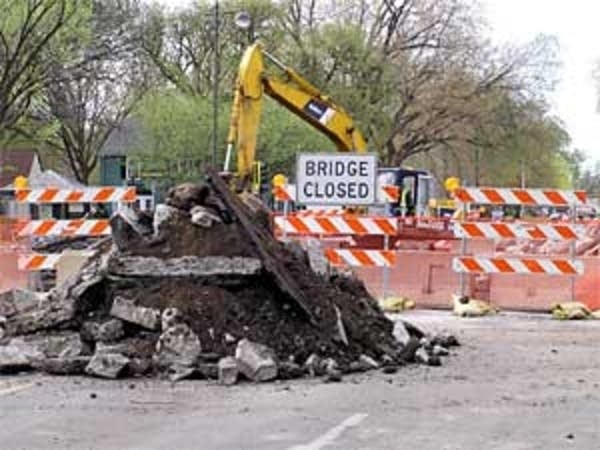No tax increase, no long term solution for transportation funding

Gov. Pawlenty proposes a one time money fix for two of Minnesota's most annoying bottlenecks. He recommends shifting $100 million from the state's general fund to help pay for rebuilding the Crosstown Commons in south Minneapolis and the "devil's triangle" in the northern Twin Cities suburbs.
The largest amount of new money for transportation, about $67 million, would come from extending the sales tax to vehicle leasing.

Then the governor turns to a familiar tool, borrowing, to fill out most of the rest of his transportation spending ideas. He proposes over the next 10 years the state borrow about $1.7 billion, about $170 million a year, to help fund transportation projects.
Margaret Donahue, legislative affairs director for the Minnesota Transportation Alliance, says the shift of money to address bottlenecks and the new revenue from a sales tax on leased vehicles are welcome.
Create a More Connected Minnesota
MPR News is your trusted resource for the news you need. With your support, MPR News brings accessible, courageous journalism and authentic conversation to everyone - free of paywalls and barriers. Your gift makes a difference.
But Donahue says the MTA is very disappointed the governor isn't proposing a way to help counties and cities rein in their growing reliance on local property taxes to pay for roads and bridges.
"That's becoming more and more of a burden. So that's something we think the governor should take a look at, as well as how do we fund the local transportation system," said Donahue.
One option is to raise the state's gasoline tax. The $650 million raised by the gas tax each year is the major source of funding for roads and bridges. There's a clamor rising from various groups to raise the tax, but the governor opposes the idea.
The governor turns to a familiar tool, borrowing, to fill out most of the rest of his transportation spending ideas -- $1.7 billion over the next 10 years.
Gov. Pawlenty is proposing the state prepare to replace the gas tax. Motor fuels tax revenue is leveling off, due mainly to fuel efficient vehicles. The governor wants to spend $5 million on a demonstration project that charges motorists for miles travelled rather than gallons of fuel burned.
There's very little in the governor's budget proposal for transit. Extending the state sales tax to leased vehicles sends some new revenue to rail and buses. And he proposes helping fill a projected Twin Cities Metro Transit deficit of $8 million.
Dave Van Hattum, a policy analyst for the St. Paul-based Transit For Livable Communities, an advocacy group, says the proposals don't go far enough.
"It does raise some additional funds, but we really think they're insufficient to keep up with the demand that we hear regionwide for increased transportation choices," says Van Hattum.
Van Hattum wants the state to give Twin Cities counties the option of approving a sales tax for transportation.

The Minnesota Chamber of Commerce opposes the metro sales tax idea. And although the business group has urged the governor to propose a tab fee and gas tax increase, Chamber president David Olson says the organization is pleased with his budget proposal.
Olson says the scenario that worries him is a continuation of transportation spending gridlock that has plagued some other legislative sessions.
"I'm worried some folks interested in transportation are going to fall into the eternal trap they've been in for years, and they're going to ask for a massive proposal with five or six different tax increases, and I think it will die of its own weight," says Olson. "So I hope that by the end, someone can find a moderate proposal that we can all support and the governor can sign."
State Sen. Steve Murphy, DFL-Red Wing, who chairs the Senate Transportation Committee, and Rep. Ron Erhardt, R-Edina, and vice chair of the House Transportation Finance Committee, have put a bill in the hopper to raise tab fees and add 10 cents per gallon to the state gas tax.
Sen. Murphy says they purposely made the bill a "Christmas tree," loaded with various transportation funding ideas, to encourage discussion.
"Some things will fall out, some things will stay. At the end of the day I think Mr. Olson and the Chamber people are going to sit there and look at that and say, 'You know, this is a lot better than the alternatives,' and I think they'll be on board," says Murphy.
The alternatives that survive will become clear as lawmakers approach the end of the legislative session in late May.
